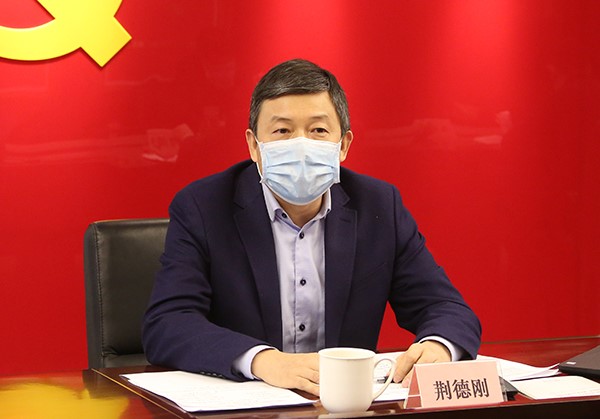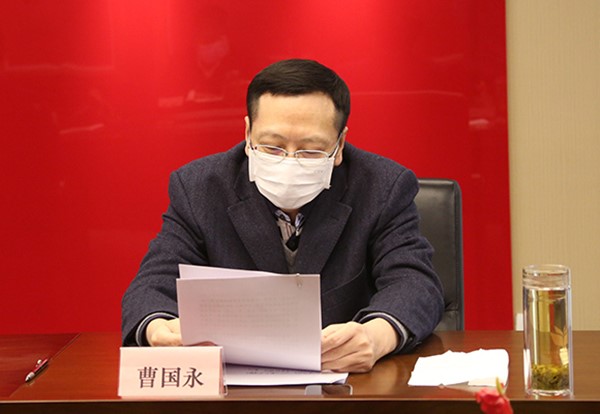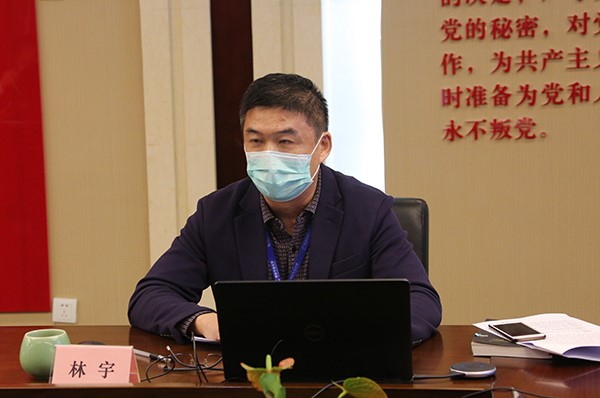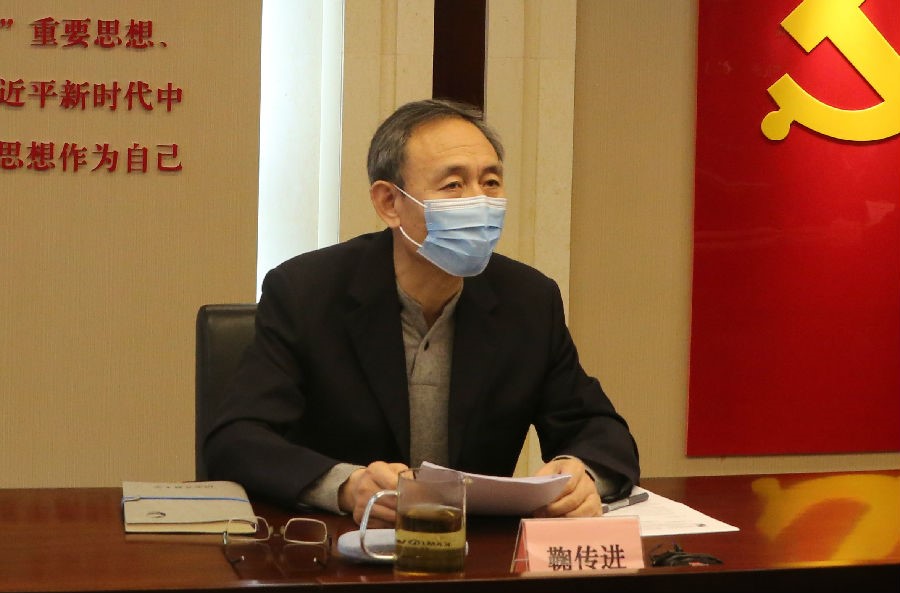 On 9 March 2020, the Open University of China (OUC) convened the its 2020 Annual Work Conference and the Conference to Coordinate Epidemic Prevention and Control Efforts and OUC Development and Deployment.
On 9 March 2020, the Open University of China (OUC) convened the its 2020 Annual Work Conference and the Conference to Coordinate Epidemic Prevention and Control Efforts and OUC Development and Deployment.

The guiding principles of General Secretary Xi Jinping’s important speeches and the relevant demands of the Leading Party Group of the Ministry of Education on COVID-19 prevention and control were conveyed and studied. General Secretary Xi has outlined the necessary efforts to coordinate both COVID-19 prevention and control and economic and social development at a series of meetings. It was noted at the OUC conference that the OUC should act on the important guiding principles laid out by General Secretary Xi Jinping, the requirements put forwards by vice premier Sun Chunlan during her survey of the OUC, and the corresponding arrangements of the Leading Party Group of the Ministry of Education. The OUC will coordinate both epidemic prevention and control and its business development in combination with the goals and tasks set at the First Party Congress of the OUC. Vice president Ju Chuanjin presided over the conference.

Jing Degang, secretary of the Party Committee and president of the OUC, made thorough arrangements for epidemic prevention and control and the work tasks for 2020. He indicated that national solidarity makes China like a fortress and that the remarkable achievements made under the strong leadership of the Party Central Committee with General Secretary Xi Jinping at the core since the outbreak of the COVID-19 epidemic fully demonstrate the obvious superiorities of the leadership of the Communist Party of China and the socialist system with Chinese characteristics. All Party members, officials, teachers, and students of the OUC system have been committed to the battle against the epidemic. They are of one heart and goal, working together to overcome the difficulties facing them. Quick action has been taken to “suspend classes but not learning” with remarkable results, which has been followed and covered by several central media. By acting in synergy, the OUC system stands together and helps each other. It has donated money and goods, and was among the first to rush to Wuhan’s aid. The cohesion of the OUC system has been enhanced, showing the beauty and warmth of radio and TV universities and open universities around the country.
Jing Degang pointed out that the prevention and control of novel coronavirus remains complicated and challenging. In order to continue prevention and control, we have to guard against war-weariness, leave nothing to chance, and not relax our efforts. We must be strict with ourselves, stay on guard, and defend ourselves to the last. We must avoid wasting the previous efforts we have made by leaving space for the virus to slip back in. We must not reduce our vigilance, our requirements or the intensity of our prevention and control measures.
Jing Degang stressed that efforts must be stepped up in order to overcome difficulties and focus on implementation in light of the important guiding principles that vice premier Sun Chunlan outlined during her survey of the OUC, as well as the requirements of the Leading Party Group of the Ministry of Education. In terms of the development of the university, new breakthroughs must be made in the following six aspects.
The first is new breakthroughs in education and teaching reform. We should stay true to the “student-centred” principle, make new explorations for the university’s transformational development, and strengthen its experimental, leading, and advanced nature. Constant reform and innovation should be made in order to accelerate the application of modern technologies such as block chain, artificial intelligence, big data, cloud computing, and 5G in teaching and management, and to further integrate information technology with education and teaching.
The second is new breakthroughs in information construction. We should speed up the construction of a 5G-based “information highway,” integrate the construction of an enriched “OUC Learning Network” with practical convenience and widespread appeal, and create a highly effective unified management support platform for data sharing.
The third is new breakthroughs in the quality and quantity of learning resources. We should organise and improve the number of online courses uploaded, and supplement and expand practical learning resources. Learning resources for degree education, social training, and the education of older adults should be advanced in terms of integrated application and shared interaction.
The fourth is new breakthroughs in the work related to the Open University for Older Adults. We should lead the exploration of the establishment of a model that supports the integrated development of the “Health Preservation and Study Tour.” We should improve the system, better the arrangement, and to try to get approval for the “OUC Healthy and Artistic Elderly Care Service Experiential National Demonstration Centre” project.
The fifth is new breakthroughs in social training. We should synergise existing resources to innovate the mechanism, introduce competent partners, make key breakthroughs, and establish an OUC training brand. We should seize the historical opportunity to combine the OUC’s own advantages with national policies to explore OUC new platforms and models for social training.
The sixth is new breakthroughs in OUC system construction. We should study and formulate the OUC Reform Scheme as soon as possible in cooperation with the relevant departments of the Ministry of Education. We should accelerate the formulation of the OUC Charter, sort out and summarise the achievements of the pilot reform, and work together towards integrated and shared development.
Jing Degang indicated that work relating to the following eight aspects should be strengthened in 2020.
The first is to further strengthen the Party’s overall leadership. We should normalise the campaign with the theme of “remain true to our original aspiration and keep our mission firmly in mind” and follow the requirement for all Party members to study the Party Constitution, Party regulations, and General Secretary Xi Jinping’s major policy addresses and to meet Party standards. We will study and put into effect the contents of the major addresses, decisions, and deployments of the Party Central Committee. We should standardise primary-level Party organisations, firmly strengthen Party building, institutionalise ideological work, and communicate distinct public opinions. We should shoulder the responsibility of exercising strict governance over the Party.
The second is to further strengthen the construction of teaching teams and student work. The cultivation of teams of master teachers will prioritise support for young and middle-aged backbone teachers, introduce a number of experts and professors, enhance cooperation between universities in China and abroad, improve the capacity of teachers inside the OUC system, and innovate student work.
The third is to further strengthen teaching and scientific research. Scientific research will be done on teaching, application, empirical cases, transformation, and reform. An incentive system for scientific research will be implemented. The university’s role in relevant international open education academic organisations will be brought into full play in order to establish the university’s scientific research in China and abroad.
The fourth is to further strengthen credit bank construction. Demonstrating the presence and role of the national credit bank will help to build its brand image, to apply information technology such as big data and block chain, to implement reform and exploration based on the credit bank, to strengthen the entity construction of the OUC credit bank, and to promote its construction and operation with the concerted efforts of the government and society.
The fifth is to further strengthen the construction of teams of officials. We should help officials who are ready and capable to take on responsibilities, and help young officials to develop themselves and stand head and shoulders above others. We should train officials by entrusting them with urgent and difficult tasks, strengthen the training of officials, improve the assessment of officials, and foster a sound work ecosystem based on honesty and integrity.
The sixth is to strengthen and expand international exchanges and cooperation. By leveraging the advantages of the OUC educational system and learning from advanced international experience, we should create model projects for international cooperation and establish modes of international business operation by achieving the sustainable extension of multiple channels, diversified means, and three-dimensional methodology.
The seventh is to further strengthen work relating to finance, logistics, security, trade unions and retirement. Each of these has its own focuses: finance focuses on broadening income sources and reducing expenditure, logistics focuses on details, security focuses on safeguarding, trade unions focus on cohesion, and retirement focuses on care.
The eighth is to further strengthen enterprise management. University-run enterprises must serve the overall situation of education and teaching reform around the central tasks of the university development. Major responsibilities and pursuits should be refocused in order to stress politics, rules, and devotion.
Jing Degang put forward two other specific tasks that should be done this year. The first is to create the OUC’s 14th Five-Year Development Plan to link the past and future. The second is to study and create a teaching team construction plan, to initiate the master teacher cultivation project, to introduce famous universities and teachers to the OUC, and to rely on the strength of high level teachers for high quality teaching.
Jing Degang underlined that it is up to all departments to put these fixed major policies and principles into effect, to further improve enforcement for quick action in an effort to make a good start, smooth progress, and a rewarding ending on our work for the year 2020.

Executive deputy secretary Cao Guoyong from the OUC Party Committee announced the assessment results and relevant awards for 2019 annual university work. He emphasised follow-up feedback work of the annual assessment results. University leaders must hold talks with officials at the level of departments in their charge in order to give feedback on assessment results, to commend achievements, and to point out the problems and directions for endeavours. Key responsible officials have to communicate the assessment results to the staff of their departments and have discussions with them. It is hoped that all the units and individuals who receive awards will make further progress and better achievements. Meanwhile, it is hoped that all teaching staff will learn from the award recipients in order to foster an ecosystem that encourages excellence and pushes the university’s reform and development to a new stage.

Vice president Lin Yu introduced ideas and arrangements for OUC teaching and reform in 2020. He said that efforts must be concentrated on teaching and reform from eight perspectives: the structure of majors, teaching teams, the construction of majors, quality guarantees, the consolidation of industry and corporate (special) colleges, the reconstruction of experimental schools, the intensification of “enrolment and examination governance,” and the application to become a university with the right to confer master’s degrees.

In his concluding speech, Ju Chuanjin charted the roadmap for the university’s development in 2020 and defined where to start and what to focus on. All the Party branches, general Party branches, departments, and enterprises of the university must have a thorough understanding of the tasks and requirements assigned to them, take due responsibilities, and focus on implementation. Careful plans and scientific arrangements must be made in order to fulfil the university’s central tasks, to minimise the impact of the epidemic, and to meet all the objectives and fulfil the tasks set for the year 2020 with resolution.
The conference was held and attended both in person in the meeting room and via video conferencing. The OUC leaders who attended in person included responsible personnel from each department, while teaching staff and managing team members of university-run enterprises attended via live broadcast from PC and mobile terminals.
Written by Yi Xin, photographed by Jin Hongyu, OUC